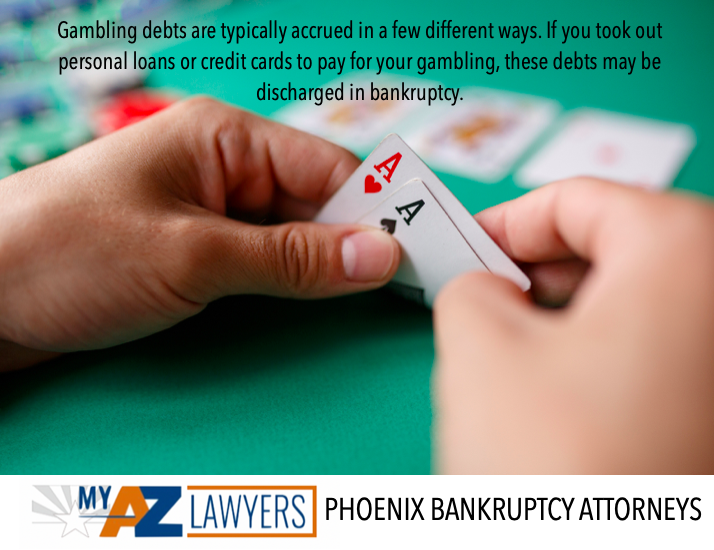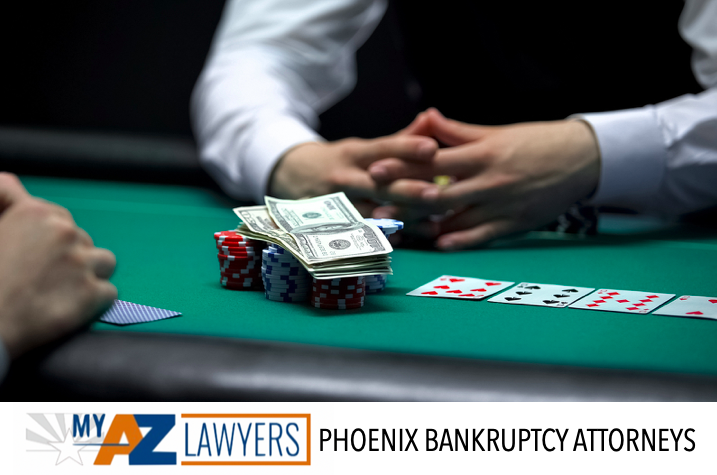Almost everyone has a friend or relative in their life who has struggled with a bad habit that grew into an addiction. For many, it is smoking, drinking, and other unhealthy lifestyle choices. For others, gambling may become a problem that gets out of control. When it does, the addict usually racks up more gambling debts than they can manage. If you are struggling with this problem, you may be wondering if bankruptcy can help you.
The different chapters of bankruptcy in Phoenix, Arizona
 Most individual bankruptcies are filed under either Chapter 7 or Chapter 13. Chapter 7 bankruptcy has strict income limits and the filer will have to surrender any assets with more equity than that state’s exemptions. Most unsecured non-priority debts will be discharged in Chapter 7. Credit cards, medical bills, repossession deficiencies, and more will be liquidated without any repayment. However, there is a caveat: debts that were fraudulently incurred can’t be discharged in Chapter 7.
Most individual bankruptcies are filed under either Chapter 7 or Chapter 13. Chapter 7 bankruptcy has strict income limits and the filer will have to surrender any assets with more equity than that state’s exemptions. Most unsecured non-priority debts will be discharged in Chapter 7. Credit cards, medical bills, repossession deficiencies, and more will be liquidated without any repayment. However, there is a caveat: debts that were fraudulently incurred can’t be discharged in Chapter 7.
In Chapter 13, debts are reorganized into a payment plan that the filer will pay over the course of 3-5 years. Certain debts, like the balance of an auto loan or past-due child support and spousal maintenance payments, must be paid in full in the plan. Other debts that are prioritized lower may only be partially paid in the plan, but the obligation for them will be discharged once the payment plan has been completed.
If you have the option between both Chapter 7 and Chapter 13 bankruptcy, you also need to understand the cost difference between the two chapters. While the filing fee for a Chapter 13 is lower ($310 versus $335), attorney representation is absolutely necessary in a Chapter 13 and costs much more than for a Chapter 7.
The length of the two chapters varies greatly and each will affect your credit differently. A Chapter 7 bankruptcy is typically completed within 4-6 months from the date the petition was filed. Except in special circumstances, a Chapter 13 bankruptcy either lasts 3 years or 5 years. The payment plan will be 3 years for filers who make less than the state median income level (which would qualify them for Chapter 7), and 5 years for those who make more than that amount. After the bankruptcy is discharged, a Chapter 7 will remain on your credit for 10 years from the filing date. A Chapter 13 bankruptcy will remain on your credit for 7 years from the filing date.
The source of the gambling debt

You may encounter difficulties discharging your gambling debt in bankruptcy if you secured your debt to any of your property. If you borrowed against the value of your home, car, or other property, your creditor will have a lien on that asset. You will either need to reaffirm (formally agree to repay with the bankruptcy court’s approval) that debt. Otherwise, you will have to surrender whatever property is being used as collateral to discharge the debt.
Another common type of gambling debt is a “marker.” Many casinos will require you to sign a marker to get chips before you can gamble. The agreement you sign for the marker may have language indicating that you have the amount you are borrowing from the casino available to repay. If you didn’t actually have those funds available at the time when you borrowed them, the court may view that as deceptive borrowing and those debts won’t be discharged in the bankruptcy.
seeking Treatment as part of the bankruptcy process
Filing bankruptcy only solves a symptom of the problem if you struggle with gambling addiction. You may want to consider seeking counseling and other treatment for your addiction before or during your bankruptcy. Some courts may see this treatment as proof that you did intend to repay a marker debt and therefore discharge it in your bankruptcy.
